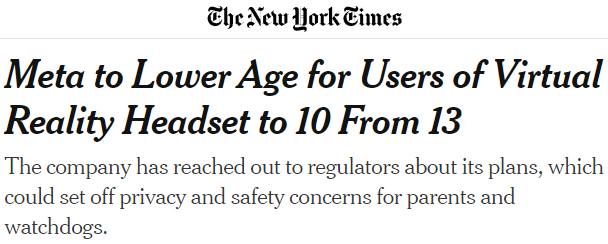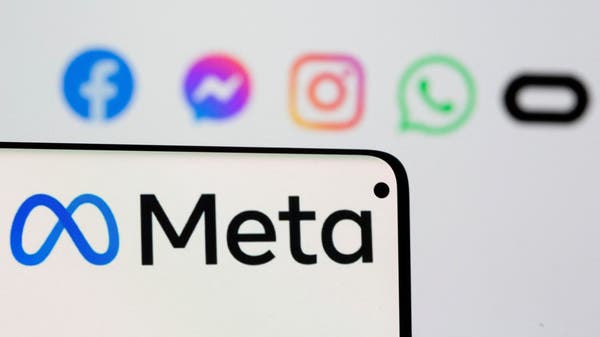EXPERT OPINION: Concerned Parents Should be Raising Alarms Over Meta Lowering Age for Virtual Reality Headset Users from 13 to just 10 years old

“As a parent and educator, I am deeply concerned about Meta‘s decision to lower the recommended age for using its Quest headset to 10 from 13,” expressed Billy Joe Cain, a concerned father of two, who has played and monitored online games with his children since they were that young.
“I was making online games for Facebook when they were that age and I know just how dangerous it is for children to be online. This move raises significant privacy and safety concerns for parents like me and should be thoroughly examined by regulators and watchdogs.”
In a recent blog post, Meta, the parent company of Facebook and Instagram, announced its intention to cater to younger audiences by reducing the age restrictions for its virtual reality headset. However, this decision has sparked fears among parents and global watchdogs who worry about the potential risks involved.

The company claims to be engaging in discussions with regulators to address immediate concerns surrounding the safety of younger children using the headset. While Meta states that parental approval will be required to set up an account and that young users will only have access to apps and content suitable for their age group, the concerns remain.
“It's not enough to simply require parental approval or restrict access to age-appropriate content,” Cain expressed. “Virtual reality is still a relatively new field, and we need to consider the risks that come with it. We must ensure that mechanisms are in place to safeguard our children from harassment, bullying, and other forms of misbehavior that are already prevalent in virtual reality games.”
The decision to lower the age restrictions is not an isolated incident. Meta has gradually been reducing the age requirements for its virtual reality apps over the past year. The company allowed individuals under 18 to use Horizon Worlds, its virtual reality-based social network, and it appears that many young users are already active on the platform.
“The real problem is a near complete lack of understanding of the reality of online grooming (learn more here). When children are online, they do not understand how to keep themselves safe, and parents don't even know this is a potential problem,” says Cain. “This is why I got involved… to make tools to teach people how to keep themselves safe.”
In response to criticism, Meta states that it is making these changes to provide families with more ways to enjoy their products while emphasizing their commitment to building safe and positive experiences for young people. However, parents remain skeptical.
“Technology use among teenagers and children has always been a contentious issue, and it's crucial that we fully understand the potential harm to their mental health and well-being,” shared Cain. “The recent warning from the United States surgeon general about the risks of social media to young people (link here) should serve as a wake-up call for policymakers and parents alike.”

The concerns surrounding Meta and its platforms are not unfounded. The Federal Trade Commission (FTC) has been actively scrutinizing the company for its handling of young users' data and has considered action to protect their privacy. Moreover, the risks associated with virtual reality are still emerging, with limited mechanisms in place to report and address misbehavior.

For Meta, the decision to lower the age requirements aligns with its strategic goal of building a virtual reality-based metaverse. Mark Zuckerberg, the company's founder and CEO, has been actively shifting Meta's focus toward this vision. However, critics argue that the move is primarily driven by business imperatives rather than the well-being of children.

Executive Director, Fairplay
“What we have seen is Meta, based solely on business imperatives, continually lowering the age of their virtual reality products and doing so without any evidence that these things are safe for young people,” said Josh Golin, the executive director of Fairplay, a nonprofit children's advocacy group, to the New York Times. “It's beyond the pale and clearly driven by the fact that they are trying to compete for a market, not driven by kids' needs.”
To assuage concerns, Meta claims it will provide parental controls, including time limits, content restrictions, and privacy settings. The company also pledges not to serve ads to the younger age group and assures parents that they can delete their children's profiles and associated data.
While these measures may sound reassuring, Billy Joe Cain stresses the importance of rigorous oversight, comprehensive regulation, and ongoing dialogue to ensure the safety and well-being of children in this evolving digital landscape.
And he emphasizes the need for comprehensive education.
“I believe that grooming is a public health crisis. It's happening to children, adults, and our elders, and it's something we have not been prepared to face. Professional predators are coming for our most precious resources: our families. We can prevent this at scale with the tools we have in place today, says Cain. “We have created the most effective, rigorous, scalable training tools on the planet and are committed to teaching people how to stay safe. Take our free online course at PBJ Learning today!”

Cain's virtual reality products, such as TRAPPED: A VR Detective Story, do not utilize online features or collect data in any way, so no identifiable data is being collected or shared. Safety and security are embedded into all his programs.
About Billy Joe Cain
Billy Joe has spent 30 years in the interactive space, creating award-winning games, simulations, educational programs, and “gamified” training products. He has launched a new EA Sports franchise, built products for Nickelodeon, delivered a flight simulator for the United States Air Force, and created and maintained online educational programs to improve critical thinking, math, and vocabulary skills. Now, his mission is to prevent human trafficking.
Billy Joe has been building educational products to fight trafficking since 2017, because his children were being groomed by a sex predator, whom he had known as a friend for years.
For his nonprofit, Radical Empathy Education Foundation, he developed an immersive Virtual Reality (VR) experience which, in 15 minutes, demonstrates how anyone could be psychologically manipulated into becoming a victim of human trafficking.
Billy Joe co-founded PBJ Learning with his partner, Dr. David Deeds, to provide online certificate-level training around the world.
He is a member of the Prevention Workgroup of the Texas Human Trafficking Prevention Taskforce for the Office of the Attorney General of Texas, Central Texas Coalition Against Human Trafficking (CTCAHT), and the Tarrant County 5-Stones Taskforce.
 ABOUT PBJ LEARNING
ABOUT PBJ LEARNING
PBJ Learning is a leading provider of online human trafficking training, focusing on awareness and prevention education. Their interactive Human Trafficking Essentials online course is used worldwide to educate professionals and individuals how to recognize human trafficking and how to respond to potential victims. Learn on any web browser (even your mobile phone) at any time.
More stories like this can be found in your PBJ Learning Knowledge Vault.
ABOUT PBJ LEARNING
PBJ Learning is a leading provider of online human trafficking training, focusing on awareness and prevention education. Their interactive Human Trafficking Essentials online course is used worldwide to educate professionals and individuals how to recognize human trafficking and how to respond to potential victims. Learn on any web browser (even your mobile phone) at any time.
More stories like this can be found in your PBJ Learning Knowledge Vault.
